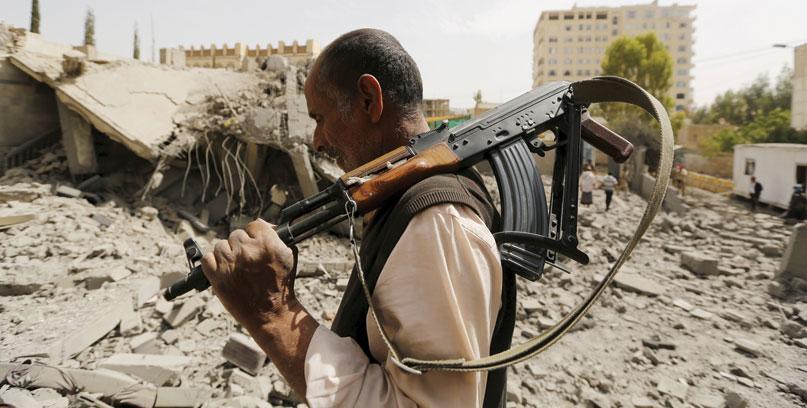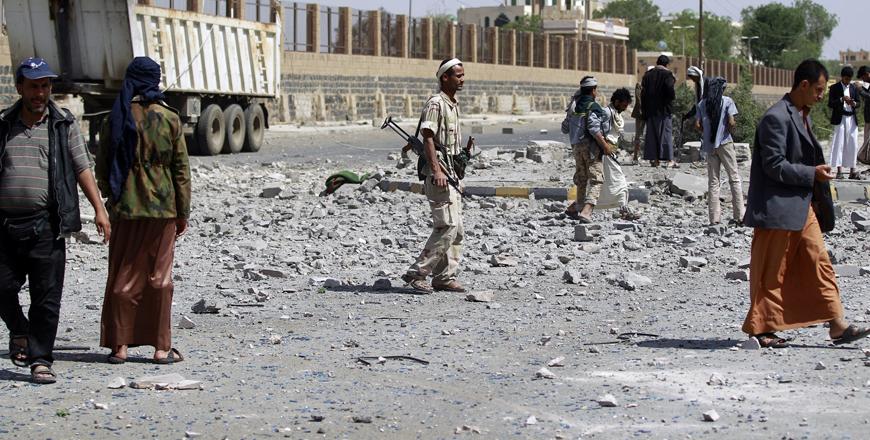You are here
UN diplomat pushes to hold Yemen talks as air strikes continue
By Reuters - Jun 01,2015 - Last updated at Jun 01,2015
SANAA — Efforts to bring Yemen's warring factions together to discuss their conflict have made some progress, officials said on Monday, as warplanes from a Saudi-led coalition mounted more air strikes against the dominant Houthi group.
Neighbouring Oman is trying to end more than two months of fighting that has killed nearly 2,000 people by mediating talks between US officials and representatives of the Houthi group.
Political sources in Oman, Yemen's eastern neighbour, confirmed on Monday that diplomats were brokering the talks between Houthi and US officials at a hotel in the capital Muscat aimed at finding a peaceful resolution to the conflict.
Independent politicians in the Yemeni capital Sanaa said the talks have succeeded in narrowing gaps between the Houthis and the exiled government to pave the way for eventual United Nations-backed negotiations in Geneva.
"There's progress in the talks toward an agreement on a long truce and reviving political dialogue," one politician told Reuters, speaking on condition of anonymity.
Oman is the only member of the six-country Gulf Cooperation Council not taking part in the military campaign in Yemen, and has played a role as a peacemaker in the strife-torn region.
The United Nations envoy to Yemen, Ismail Ould Cheikh Ahmed, has also achieved progress in efforts to convene talks in Geneva, Yemeni government spokesman Rajeh Badi said.
He said progress was made on “the date, agenda and framework for the Geneva talks and the parties that attend the meeting” and that a formal announcement was expected within hours.
Ould Cheikh Ahmed was in the Saudi capital Riyadh for talks with Yemeni President Abed Rabbo Mansour Hadi, political figures and the government headed by Vice President Khaled Bahah. Before that, he held talks with Houthi leaders in Sanaa.
Previous plans for talks in Switzerland were postponed due to objections by the Riyadh-based Yemeni government, which wants the Houthis to quit Yemen’s main cities and recognise Hadi’s authority before speaking to them.
An Arab alliance has been bombing the Houthis since late March in a bid to restore Hadi to power. The Sunni Muslim states see the Houthis as a proxy for the influence of archrival Iran in impoverished Yemen.
The United States, the main ally of the world’s biggest oil exporter Saudi Arabia, has provided the kingdom with weapons and intelligence during its war against the Houthis.
The Houthis want a ceasefire as a precondition for talks, and the Yemeni politicians say the UN envoy has made progress toward an agreement on a five-week ceasefire and the release by the Houthis of several detained pro-Hadi figures — including the defence minister and the president’s brother.
Air strikes
Saudi planes and artillery on Monday bombed the Houthis’ northern stronghold province of Saada, bordering the kingdom.
The Houthis, who swept into Sanaa in September and fanned out across the country, say they are winning a revolution against corrupt officials and hardline Sunni militants.
Air strikes hit military positions aligned with the Houthis in Sanaa on Sunday, and residents reported the sounds of explosions and anti-aircraft fire continuing into Monday.
Warplanes also dropped bombs on Houthi fighters on the outskirts of Aden, a bastion of support for Hadi and scene of heavy clashes between the two sides.
A near-blockade of Yemeni skies and ports by the Arab coalition has led to severe shortages of food and fuel to its 25 million people, and aid groups have warned that the continuation of fighting could deepen the humanitarian crisis.
Famine Early Warning Systems, a monitoring group focusing on hunger, said on Monday that food price increases and lack of income could soon push remote areas of Yemen into emergency.
“Due to the continued impact of ongoing shocks, food security outcomes are likely to deteriorate over the coming months,” the group said in a statement.
The Local Rescue Committee, a Yemeni humanitarian group in the southern province on Dhalea, said residents in the area were suffering.
“Food, fuel and electricity are in short supply while sickness is spreading due to poor sanitation and stopped rubbish collection, meanwhile Dhalea is cut off by Houthi militias from resupply in every direction,” a committee official said.
Related Articles
GENEVA — UN Secretary General Ban Ki-moon launched Yemen peace talks in Geneva on Monday with a call for a humanitarian truce after warplane
DUBAI — Oman is mediating between Yemeni President Abed Rabbo Mansour Hadi's government and its Houthi opponents over a UN plan to resume pe
DUBAI — Aircraft from a Saudi-led coalition bombed Yemen's Houthi outposts throughout the country on Sunday, residents said, while Yemen's g
















